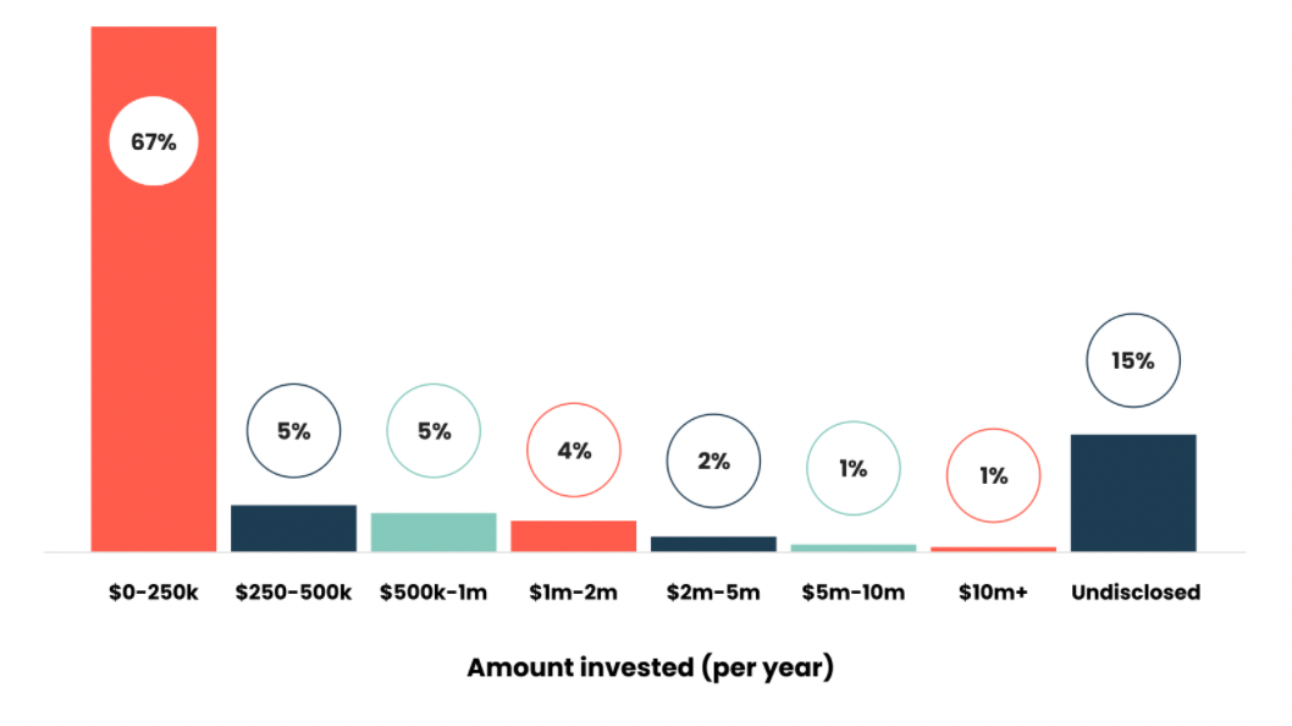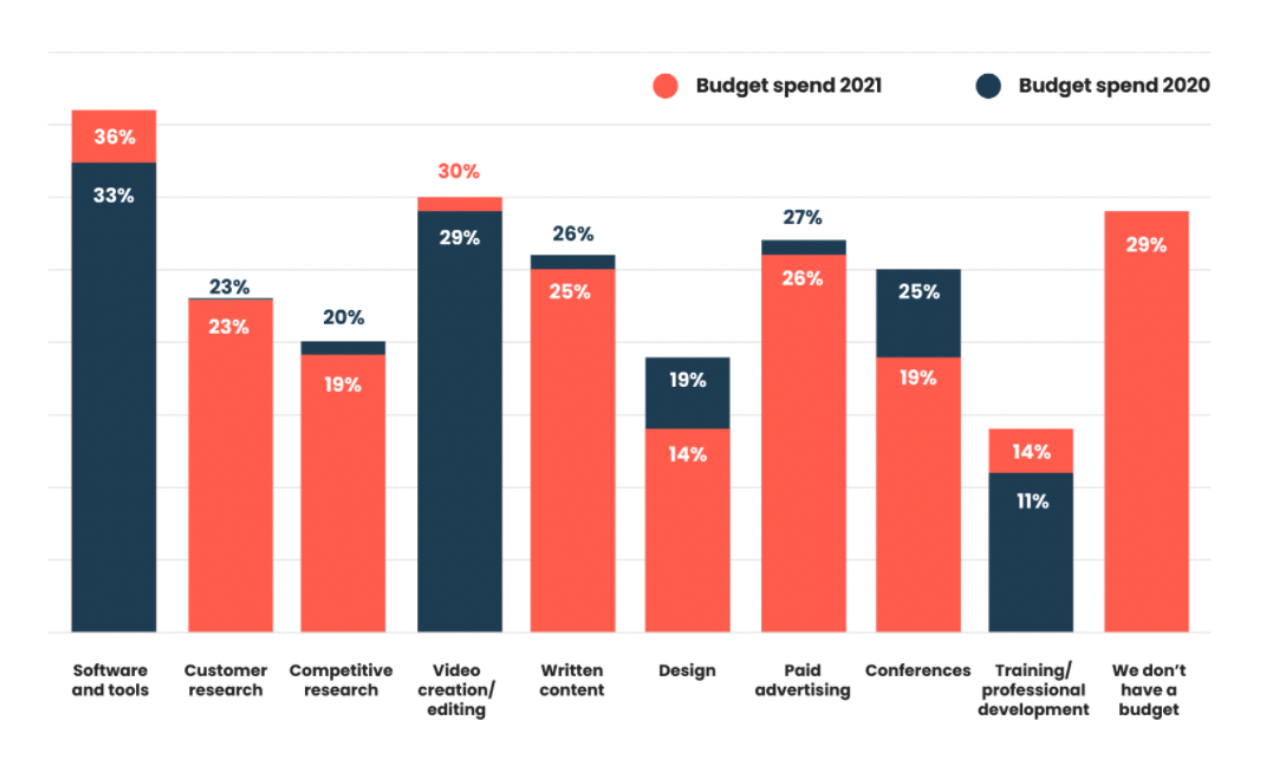As we discovered in the 2021 State of Product Marketing report the number of people transitioning into a PMM career is on the rise; many are fixing their gaze on the roles of Associate Product Marketing Manager and Product Marketing Manager, with both positions offering the perfect platform to build a career within the industry.
Recruiting companies are doing all they can to get the most out of their new hires - but are they overwhelming their product marketing teams in an attempt to do so?
While it's human nature to want the most out of our investments, hiring managers and team leaders shouldn’t be recruiting Product Marketing Managers to make them work as Content Manager, Project Manager, Marketing Managers, etc.
Product marketing is a combination of tactics, strategy, and vision. If you need something else, great; just understand what product marketing is before writing a job spec.
Product Marketing Managers need to participate in the strategy and vision of the products they’re working on. Empower them to fully understand the strategic nature of their role. After all, the more they grow, the more you grow.
We’re exploring the weight of expectation being put on the shoulders of product marketers, and asking whether too much is being expected of those in a PMM position. We’ll focus on:
- Why a product marketing team is valuable
- How much budget is being allocated to product marketing
- Where budget is being spent
- The roles and responsibilities of product marketers
- How product marketing teams are structured
- How many products are supported by product marketers
- Perspectives from the product marketing community
- How to build a product marketing team from scratch
- How to improve your leadership skills
Why is a product marketing team valuable?
Whether you’re a start-up, or an established company breaking the product marketing mold, in today’s competitive market, having a dedicated product marketing team can play a pivotal role in ensuring you resonate with your market and buyer.
After all, if you don’t know your target market, your appeal will diminish, along with your sales.
A product marketing team contributes significantly to marketing and sales strategies that can differentiate you from your competitors. It’s an essential piece of the company puzzle, and while we’re biased, the benefits are clear.
As advocates of the PMM process, we’ve been blowing our own trumpet for a while now, and it’s no real surprise that more companies are keen to jump on the bandwagon, and reap the rewards of having a kick-ass team on their roster.

How much budget is being allocated to product marketing?
In the 2021 State of Product Marketing Report, we explored how much budget is being allocated to product marketing.
While money can’t buy the kind of drive and dedication that we see oozing from the PMM community, a solid product marketing strategy needs investing in if it’s going to succeed.
Last year, 47% of annual product marketing budgets were in the $0-250,000 range, with only 6% of teams having the luxury of $1million or more to play with. This year, most product marketing teams are working with an annual budget of $0-250,000 (67%), with 7% hitting the $1million+ mark.
When we went digging a little deeper into the results, we found that, unsurprisingly, those working with the $1million+ budgets were a mix of enterprise and late growth/scale-up companies.
Those with more modest annual budgets of $0-250,000 were mostly mid-growth companies with established go-to-market teams, late-growth companies, and those in the early post-product-market fit category.

Where are product marketing budgets being spent?
When it comes to where budgets are being spent, it turns out most of the money is being invested into software and tools (36%); content creation, including video (30%) and written content (25%); and paid advertising (26%).
Almost 3 in 10 (29%) say they don’t have a budget. This is a concerning figure that we hope to see improve as understanding and appreciation for the role of product marketing continues to progress.
Only 14% say any budget is allocated to training and professional development. With 63% of PMMs looking to take the next step in their career in the not-so-distant future though, companies might need to start thinking about investing more in the upskilling of employees if they’re going to retain talent.

Alternative answers that fell under the ‘Other’ category included ‘PR’, ‘Translations’, ‘Analyst Relations’, ‘Salaries’, ‘Demand Gen’, and ‘Lead Gen’. Another common reason was along the lines of: “Our product marketing budget isn't independent on the wider marketing budget”.
There were also a considerable number of respondents admitting they “don’t know” or were “unsure” what budget was allocated to product marketing and/or where it is being spent.
This might explain the 15% of undisclosed budgets, suggesting there are still far too many PMMs in the dark about matters of money relating to them.
The roles and responsibilities of product marketers
You don’t need us to tell you that product marketers tend to wear a lot of hats and spin a lot of plates; it’s a super cross-functional role with many different facets and responsibilities, but it could be argued PMMs are being stretched too far.
As with the 2020 report, product positioning and messaging (92%), managing product launches (79%), creating sales collateral (78%), customer and market research (72%), and storytelling (60%) were the top five PMM responsibilities cited.
In fact, the only real diversion from last year was the addition of customer marketing, which stole a considerable 40% of the votes. This wasn’t something we covered in 2020 but something we’ll certainly continue to spotlight as customer marketing continues to move more into focus.

Of those who selected ‘Other’, ‘Competitive intelligence’ and ‘Sales enablement’ were two of the most common areas of PMM support, alongside others including ‘Campaign strategy’, ‘Packaging and pricing’, ‘Value messaging’, and ‘Analyst relations’.
How should a product marketing team be structured?
While capital investment and allocating appropriate roles and responsibilities play an important part in helping PMMs perform, structuring your team accordingly also plays a huge role in helping your team perform to its full potential.
There’s no one, definitive way to structure a product marketing team. Every organization varies in size, stage, and function.
While some organizations favor a feature-first structure, for others it’s function. Customer-centric companies may prefer to structure by line of business. Salesforce is a great example of this in action and a solid choice for businesses with buyers across different functions.
This particular structure works for Salesforce as they sell different products to different buyers in the same company.
But, what’s good for the goose, isn’t always good for the gander, and while we don’t have the magic formula for the perfect team structure, we do have an awesome community of product marketers who generously shared data on their team structure, average team size and the stage of their organization.

How many products are PMMs supporting?
In the 2020 State of Product Marketing Report, we found that 33% of product marketers were supporting 5+ products, and this year, the figure is marginally higher again (34%).
The number of PMMs supporting 5+ products has climbed incrementally over the past three years (2019-2021), so we can probably expect this trend to continue into 2022.
That said, with the verticalization of the PMM role and the rise in the first-time PMM hires identified by our experts when asked how the landscape has changed over the past year, this could be set to change.
Next year, we might see more hands-on the product marketing deck within orgs and as a result, see PMMs supporting fewer products but with more focus and support.
Raw statistics only tell half the story, so we spoke with product marketers directly and asked them if they believe product marketing is fully understood.
Do product marketers think they’re being utilized properly?
“The sad reality is that in many companies, the differences between the various marketing functions are not understood at all.
“To most management types, marketing is marketing. Then if you add in the differences between product marketing and all the other marketing functions, you've completely confused them.”
Richard Hatheway, Senior Product Marketing Manager at Hewlett Packard Enterprise
“The PMM role is often misunderstood because the expectations and responsibility of a PMM differ from one business to another - especially at startups depending on which stage it’s at.
“As it is a versatile role, it also means there are different types of PMMs.
“It’s also a function that’s growing in demand across industries. Some people new to the concept don’t fully understand what the role is or even why they have a PMM. So it is sometimes shoehorned lower down the ranks under one of the functions.
“To be honest, I don’t think the job title ‘Product Marketing Manager’ conveys the strategic nature of the role. It represents the overlap between product and marketing - but then confuses people with this. Unlike the agency world equivalent where this role is probably closest to a Strategist or Planner.”
Amanda Lieu, Product Marketing Manager at SEON
“The inherent nature of a product marketer and their cross-functional skillset empowers them to view the market, solutions, and products from multiple angles, allowing them to be a strategic and creative asset.
“Throw in the role of a strategy team whose sole focus is go-to-market, and these skills are devalued and dismissed leaving the product marketing role open for only marketing execution. A lot of growth companies don’t have a clearly defined role for product marketing and end up giving them multiple hats to wear, most often hats that are outside of their strong skill set.”
Jamie Claeys, Director of Global Product Marketing at FarEye
“Personally, I've been thinking that product marketing and product managers should be one role, and the size and maturity of the company should probably have some influence.
“However, the more I learn about product marketing the more I think that product managers need to focus more on the customer.
“From a communications perspective, I find that I, as a product manager for a technical product, want to sell more and build less, because nothing is worse than building features that customers don't want or won't pay for.”
Todd Kovalsky, Head of Growth at A Spirit Animal
“Having worked on many lean teams, often as the only PMM hire, I’ve had to wear all the hats.
“While I still fill many broader marketing and product management needs, I’m getting better at educating my team on where my strengths are and helping us fill the gaps together.”
Stephanie Rubenstein, Product Marketing Manager at The Linux Foundation
“Unfortunately, many don’t know what the different areas of marketing are and what they do, it’s just marketing; we don't make it that easy either because there is always a new fancy name.
“The default approach I’ve seen is one person is hired to do everything and product marketing is thought of as the promotion of a product once it’s ready. It then takes a lot of time and effort to unpack and change that. I do like to think that with the advent of so many startups now, that this is changing.”
Rebecca Hardisty, Marketing Manager at Camlock Systems Ltd.
“The other dimension here is the company stage. It's usually not possible to add tremendous value as a product strategist and visionary if one is constantly being pulled to improve outbound product marketing, as well as support and train sales teams.
“Larger companies like Facebook and Google have the luxury of splitting these roles so the person can focus, but trying to do both is a recipe for swift burnout and missed expectations.”
Scott Hannah, Director of Product Management at Marriott International
“The reality, though unfortunate for many, is that companies are increasingly demanding some level of content creation/strategy from a PMM.
“The vast majority of PMM jobs are in startups that require some level of wearing multiple hats. It's true in many other companies as well. From the POV of a CEO, you're simply expected to do more than just sit in meetings ‘strategizing’ all day.”
Perry Sun, Product Marketing Manager at Atlona
“I’m going to challenge the PMM's. Don't take a role that isn't what you want, learn how to vet the opportunities and look past the title, learn to interview to find out the hidden day-to-day.
“The onus is on the PMMs as much as the hiring leaders, who don't always know what they need or have a title for it. If they never fill the role, they will change the spec.”
Shelley Perry, Managing Director at Scalelogix Ventures
“The funny thing is, product management and product marketing always get done, regardless of whether a company understands the roles or hires for them.
“In smaller organizations, product management is effectively done by customers and product marketing is done by the CEO. If you don't have structured product marketing, sales and marketing (internal or external) can't do their jobs effectively because they are always asking management what to say. I’ve never seen product management doing product marketing work well.”
Jennifer England Gaetje, Technology Product and Solutions Marketing Leader
“Too often in software, product marketing is left as the last step in going to market.
“The reverse is just as true - hire Product Marketing Managers. Don't expect content, marketing, and project managers to do both their job and cover for the gap in product marketing identified in your post.”
Chris Luckenbill, Director of Marketing at GPS Insight
“Empowering and developing the strategic arm of a product marketer will stand to benefit organizations the most.”
Robert McGrath, Product & Growth Marketing Leader at LinkedIn
“Strategy sessions should be a cross mix of people with representation from each department but the meeting can’t be so big it accommodates everyone.
“Product managers can rotate turns in and out of strategy meetings and relay meetings back to their respective teams. An EA will also be in the room to take detailed notes, follow up on all action items. You need to always work together as a team.”
Ilana Kearns, Founder at Goat Matters
“I interviewed with a company and midway through the discussion, I was being asked questions that had more to do with project management.
“I tried to keep redirecting to my product marketing skills until I realized they didn't understand the role for which they were hiring. Needless to say, things did not go well.”
Rory Wade-Easley, Product Marketing Consultant
“More leaders need to understand the difference between product marketing and marketing (in general). Asking product marketers to do content, digital, or work as a generalist is a waste of their talent and is equally detrimental to the growth of your organization.”
Manwendra Mishra, Marketing Manager at Merkle Science
How to build a product marketing team from scratch
There’s no doubt that companies trying to build a new product marketing team from scratch will have the best interests of their team at heart.
However, even the most senior figures aren’t exempt from making mistakes. As our research has highlighted, they can invest in the wrong areas, and allocate roles and responsibilities that shouldn’t fall under the remit of a product marketer.
Stacey Wang, PMM Team Lead, Ironclad Inc. gave her insights on how to build a mission-critical, strategic product marketing function from the ground up.
We also caught up with Genson Glier, Chief Operating Officer at togetherAI (formerly Senior Product Marketing Manager at Cheq), who shared his expertise on how to scale product marketing teams from the ground up.

How to improve your leadership skills
The very best product marketers work under the helm of ambitious, inspirational leaders.
We have just the ticket to help you enhance your leadership and empower your team with our latest certification program, Product Marketing Certified: Leadership.
Product Marketing Certified: Leadership will equip you with the insider knowledge you need to create a lasting, successful career as a product marketing leader. You’ll get the fundamental skills required to guide your team with authority, confidence, influence, and innovation.
Trust us, becoming an amazing product marketing leader doesn’t happen by chance. It happens through hard work, dedication, and education.. Product Marketing Certified: Leadership has been built on the back of decades’ worth of experience from some of the world’s best-known brands with one goal in mind: helping you be the best leader you can be.
Plus, when you’ve signed up for the course, tune into our brand-new podcast series, 48 hours to Lead, and explore the minds of the most influential product marketers at the helm of the world's best brands.

For now, join pioneering product marketing leaders from elite organizations like LinkedIn, Hotjar, and Shopify and transform yourself into the best leader you can be.
And for Pete's sake, if you're not sure what product marketing is, check out our definition - for the sake of you, and your team.
Get Leadership Certified

 Follow us on LinkedIn
Follow us on LinkedIn

